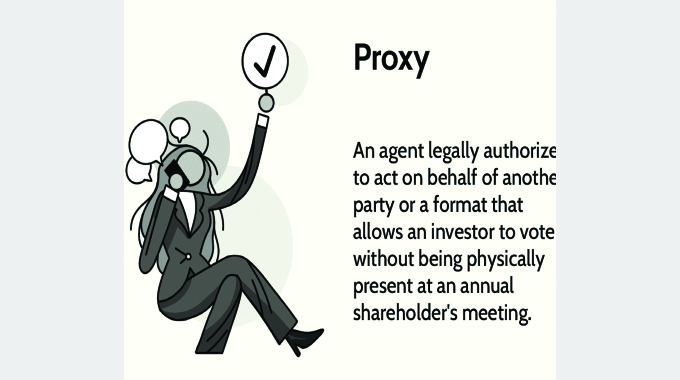Using proxies in company shareholder meetings

Godknows Hofisi Business Law
Introduction
The use proxies at company annual general meetings (AGMs) or extraordinary general meetings (EGMs) is common practice in corporates. In this article I look at the law as it applies to using proxies in such company shareholder meetings in Zimbabwe.
Using proxies at meetings of shareholders
The use of proxies is covered in section 171 of the Companies and Other Business Entities Act (Chapter 24:31), “the COBE Act” or “the Act.
According to section 171 of the COBE Act any member of a company entitled to attend and vote at a meeting of the company shall be entitled to appoint one or more persons, whether members or not, to act in the alternative as his or her proxy, to attend and vote instead of him or her, and a proxy appointed to attend and vote instead of a member shall have the same right as the member to speak at the meeting.
From the foregoing it is clear that a proxy is a representative of the shareholder with full authority to attend shareholder meetings and participate thereat in the same manner the actual shareholder would have participated.
The instrument, usually a signed proxy form, appointing a proxy to vote at a meeting of a company shall be deemed also to confer authority to demand or join in demanding a poll.
Section 171(3) requires that in every notice calling a meeting of a company and on the face of every proxy form issued at the company’s expense shall appear, with reasonable prominence, a statement that a member entitled to attend and vote is entitled to appoint one or more proxies to act in the alternative, to attend, vote and speak instead of him or her. A proxy does not need to be a shareholder.
In terms of section 171(4) of the Act any provision contained in the company’s Articles of Association shall be void if it requires the instrument appointing a proxy, or any other document necessary to show the validity or otherwise of the proxy appointment, to be received by the company or any other person more than 48 hours before the meeting, for the proxy to be effective or accepted at the meeting.
It is an offence, in terms of section 171(5) of the COBE Act, for the company to selectively invite some members to appoint proxies and exclude others, unless an officer of the company issues the proxy instrument to the member upon a request by that member.
In terms of section 171(6) on a poll taken at a meeting of the company a member entitled to more than one vote need not, if he or she votes, use all his or her votes or cast all the votes in the same way. In other words a member can use his or her votes differently at the same meeting.
A director or officer of a company may not act as a proxy for a shareholder. Doing so is an offence in terms of section 171(8) of the Act.
Importantly, no proxy appointment shall be valid longer than six months unless otherwise provided in the proxy appointment or the company’s Articles of Association.
Any vote cast by a person purporting to vote as a proxy when he or she is a director or officer of the company or the proxy appointment is longer than six months unless provided in the proxy appointment or the company’s Articles of Association, shall be invalid.
Conclusion
Use of proxies at a company’s shareholder meetings can be convenient but this has to be done in terms of the law.
Disclaimer
This simplified article is for general information purposes only and does not constitute the writer’s professional advice.
Godknows (GK) Hofisi, LLB(UNISA), B.Acc(UZ), CA(Z), MBA(EBS,UK) is a legal practitioner / conveyancer, chartered accountant, corporate rescue practitioner, registered tax accountant, consultant in deal structuring and business valuer. He is also a director with Investacare International (Private) Limited. He writes in his personal capacity. He can be contacted on +263 772 246 900 or [email protected]









Comments